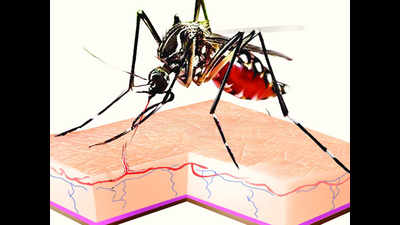- News
- City News
- Hyderabad News
- More diagnostic centres needed in Telangana: Amicus curiea tells HC
Trending
This story is from September 14, 2019
More diagnostic centres needed in Telangana: Amicus curiea tells HC
Highlighting the severity of dengue outbreak and growing concerns over the number of cases, the high court was informed that Telangana has just two diagnostic centres in Hyderabad to test and detect diseases like dengue, swine flu and malaria.

Representative image
HYDERABAD: Highlighting the severity of dengue outbreak and growing concerns over the number of cases, the high court was informed that Telangana has just two diagnostic centres in Hyderabad to test and detect diseases like dengue, swine flu and malaria.
Amicus curiae S Niranjan Reddy said the time has come to set up eight diagnostic centres across the state to fight the diseases.Asserting that Telangana should not lead a lone battle against dengue and other diseases, he said the state should make use of the expertise of the central government and the National Vector Borne Disease Control Agency (NVBDCA).
Stressing the point that only two centres — one at the Institute of Preventive Medicine (IPM) and the other at Government Fever Hospital in Nallakunta — would be of little use to control the spread of the diseases, Niranjan suggested that the number of diagnostic centres should immediately be increased. He was making these suggestions while assisting the court in the hearing of a PIL which challenged the alleged inaction of the government to prevent and control the spreading of dengue, chikungunya, malaria and other diseases.
A bench of Chief Justice Raghavendra Singh Chauhan and Justice A Abhishek Reddy on Friday heard the PIL filed by advocate Rapolu Bhasker Netha.
“A comparitive study of steps taken by various governments to control these dreaded fevers could also serve the purpose,” the senior counsel said, citing the example of Punjab, which in coordination with WHO, had developed a micro-strategic action plan for elimination of Malaria between 2018-2020. A specific action plan for swine flu detection and eradication should also be prepared, he said.
Niranjan felt there was no coordinated effort among the authorities of various wings to deal with the health problems. All the registered diagnostic centres and doctors should be informed about existing swine flu detection facilities and the protocol to be followed on collection of blood samples, etc. “Early detection will certainly arrest the spread of these vector-borne diseases,” he said.
Apart from organising awareness campaigns on mosquito menace, dissemination of information to people and medical fraternity on these diseases was vital both in prevention and treatment, he added.
The court had sought assistance of Niranajan to issue certain guidelines to the authorities concerned.
Amicus curiae S Niranjan Reddy said the time has come to set up eight diagnostic centres across the state to fight the diseases.Asserting that Telangana should not lead a lone battle against dengue and other diseases, he said the state should make use of the expertise of the central government and the National Vector Borne Disease Control Agency (NVBDCA).
Stressing the point that only two centres — one at the Institute of Preventive Medicine (IPM) and the other at Government Fever Hospital in Nallakunta — would be of little use to control the spread of the diseases, Niranjan suggested that the number of diagnostic centres should immediately be increased. He was making these suggestions while assisting the court in the hearing of a PIL which challenged the alleged inaction of the government to prevent and control the spreading of dengue, chikungunya, malaria and other diseases.
A bench of Chief Justice Raghavendra Singh Chauhan and Justice A Abhishek Reddy on Friday heard the PIL filed by advocate Rapolu Bhasker Netha.
The amicus curiae, in his report, further said the government should coordinate with specialised agencies lile NVBDCA and National Institute of Malaria Research, working under the Union ministry of health and family welfare. Both the ministry and World Health Organisation (WHO) had issued clear guidelines on the diseases and the state should follow them, the senior counsel said.
“A comparitive study of steps taken by various governments to control these dreaded fevers could also serve the purpose,” the senior counsel said, citing the example of Punjab, which in coordination with WHO, had developed a micro-strategic action plan for elimination of Malaria between 2018-2020. A specific action plan for swine flu detection and eradication should also be prepared, he said.
Niranjan felt there was no coordinated effort among the authorities of various wings to deal with the health problems. All the registered diagnostic centres and doctors should be informed about existing swine flu detection facilities and the protocol to be followed on collection of blood samples, etc. “Early detection will certainly arrest the spread of these vector-borne diseases,” he said.
Apart from organising awareness campaigns on mosquito menace, dissemination of information to people and medical fraternity on these diseases was vital both in prevention and treatment, he added.
The court had sought assistance of Niranajan to issue certain guidelines to the authorities concerned.
End of Article
FOLLOW US ON SOCIAL MEDIA










